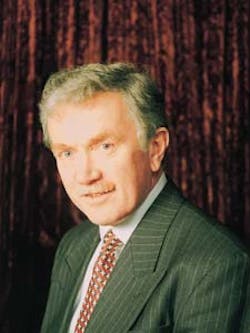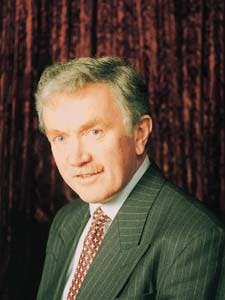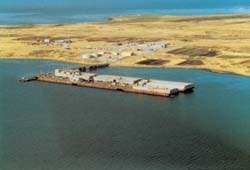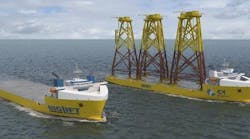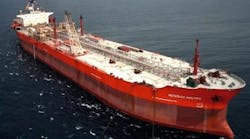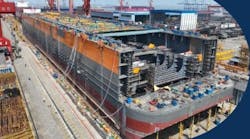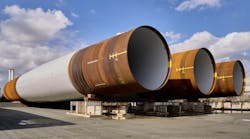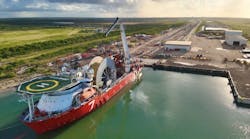Common ground between Argentina, UK stimulates Falkland exploration effort
(Left) Andrew Gurr, chief executive of the Falkland Islands government. (Right) Aerial view of Stanley Harbor and the Falkland Interim Port and Storage System (FIPASS).
Unfettered exploration around the Falklands looks feasible following the signing of an accord between Argentina and the UK. The two countries agreed late September to cooperate on exploration and development of hydrocarbons in the southwest Atlantic away from the immediate vicinity of the islands. Waters west of the islands around the Argentine/UK median line have been named "areas of special cooperation." Here, taxes and commercial terms relating to any future activity will be jointly administered. Block auctions could begin shortly.
Signing of the declaration in New York allowed the Falklands' own licensing round to proceed without incident in London a week later, followed by a similar presentation in Houston. All sides could claim a level of satisfaction from the outcome. For the islanders, for instance, the joint agreement states that there is nothing in it signifying a change of stance by the UK over Falklands sovereignty.
Argentines have viewed events differently. Apparently there was initial jubilation that this was a great stride towards the aim of reclaiming the Malvinas. For President Carlos Menem and the Argentine oil industry, the agreement opens opportunities in an area of known hydrocarbon promise.
It remains now for Argentina's congress to rescind approval for a bill, sponsored by the President's brother Eduardo, threatening litigation against any oil company operating in the disputed waters. Yet to be resolved, however, is Argentina's insistence on a 3% levy on oil revenues from Falklands blocks, as well as an exploration fee dependent on the size of the block.
Britain has publicly rejected these demands, though it will not stop applicants to the Falklands licensing round volunteering extra payments to Argentina. Signing of the Joint Declaration, at least, was timely for some coming a week before the round opened. According to Andrew Gurr, chief executive of the UK's Falklands Islands government, some interested Japanese oil companies just "didn't want to know" if agreement with Argentina had not been reached.
License details
Terms for the round are in line with legislation on Falklands oil exploration issued in August 1994. Production licences can be maintained for a total period of up to 57 years. This breaks down into three exploration periods totaling up to 22 years, and a development phase of up to 35 years. Drilling becomes mandatory in the second exploration phase.
The designated exploration area around the Falklands is over 400,000 sq km in size, roughly 50% bigger than the UK North Sea. Up for bid this time are 19 tranches comprising varying numbers of blocks. Twelve of these tranches lie north of the islands, with the remaining seven situated to the south and south-east, where water depths approach 500 meters.
Applications for tranches, which must include environmental impact statements, are to be submitted to the London-based Falkland Islands Oil Licensing Administration by July 2, 1996, with licence awards due two months later. Government tax takes are said to be competitive with other regimes: theoretically around 46% for a 500-million bbl field based on an $18/bbl oil price.
Chief environmental considerations are the 64 species of birds resident on the islands, including the world's largest breeding population of black-browed albatross. There are also substantial quantities of finfish, illex, and loligo squid fished in Falkland waters.
Exploration, consequently, is not permitted within a radius of 25 miles around the islands. According to Gurr, datasets suggest these waters are not particularly prospective anyway. He has also discussed the program with Greenpeace, who apparently "made it clear they don't agree with oil exploration anywhere".
Recent reports suggest weather conditions would affect activity close to the islands. A statement from the UK's Meteorological Office, for instance, mentions "waves higher than office blocks". In reality, says Gurr, "although you do get big waves in the South Atlantic, the prevailing westerly wind first has to cross South America, which brakes the height of the waves as they reach the Falklands".
Typically, wave heights exceed 4 meters only 14% of the time for nine months of the year. These conditions, Gurr claims, meant that the seismic vessels performing surveys around the islands in 1993 suffered less downtime than counterparts in the North Sea.
Communications growth
Gurr is also peeved at the Falklands' "frontier" tag. He points out that there are two international airports on the islands, with Bristow also establishing a heliport recently. Cable and Wireless provides telecommunications links to the world via an earth satellite station, where facilities were upgraded last month through introduction of high speed data transmission facilities.
The UK military offers search and rescue services to fishing fleets which would be extended to the oil industry. Port facilities are available in the shape of a floating system in the capital, Stanley, which offers bunkering, fresh water and cargo handling via a 25-tonne crane.
Accommodation is limited to two hotels, one of which has put in for planning permission to expand. Flotel operators might benefit from the lack of rooms. Alternately, oil and service companies will have to house staff in mobile homes, or dispatch them to bases 300 miles away in South America. Any Argentines employed would have to work from the mainland, as their nationals are currently not allowed to set foot on the islands.
One bonus to the industry is that the islands have full employment, so there is no need to offer a training sweetener in order to secure a licence. Currently teenagers are encouraged to go overseas to complete their education, paid for by the Falklands government. In due course, however, FIG would like to see opportunities given to schoolchildren with engineering potential, according to council member Bill Luxton.
Seismic findings suggest continuation
of promising Argentine trends
Waters close to the Falklands are undrilled, apart from one alleged Texaco well to the south. Several hundred kilometers to the east on the Maurice Ewing Bank, three boreholes were drilled in 1974 by the Deep Sea Drilling Program which confirmed the existence of potential oil source rocks in the area.
In the adjoining Argentine part of the offshore Malvinas Basin, however, 17 wells are known to have been drilled. Although none has yielded commercial hydrocarbons, resultant oil and gas shows are said to be encouraging. And a well late last year in the San Julian Basin northwest of the islands reportedly found oil shows within a 300 meter thick reservoir interval.
Seismic data is more plentiful. The first commercial surveys were shot in the late 1970s by Western Geophysical and GSI over an area of 21,652 km in the late 1970s with line spacings of up to 90 km. These were partly reprocessed by GSI in 1991.
Main interest in the current licensing round derives from two surveys shot south and north of the islands in 1993 by Geco-Prakla and Spectrum, subsequently interpreted by the British Geological Survey. These confirmed the existence of a number of interesting areas.
Findings suggest that much of the South Falkland Basin is underlain by Devono-Carboniferous and Permo-Triassic rocks similar to those forming the landmass of the Falkland Islands. These rocks may have potential to form deep reservoir sequences, especially if poro-perm values have been enhanced by secondary porosity processes.
The North Falkland Basin is said to be similar geologically to the San Jorge Basin to the northwest, which is an established petroleum producing basin.
No further independent seismic surveys are planned for Falkland waters. Future activity will come from tranche licence holders under their phase 1 exploration commitment program
Copyright 1995 Offshore. All Rights Reserved.
